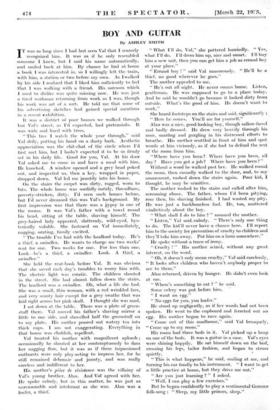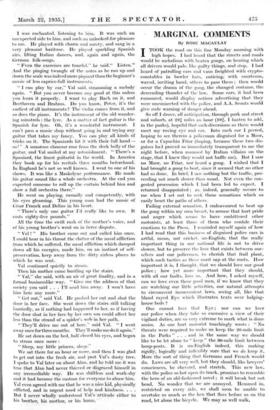BOY AND GUITAR
By ASHLEY SMITH
IT was so long since I had last seen Val that I scarcely recognized him. It was as if he only resembled someone I knew, but I said his name automatically, and smiled back at him. By chance he hbAl at home a book I was interested in, so I willingly left the train, with him, a station or two before my own. As I walked by his side I realized that I liked him sufficiently to feel that I was walking with a friend. His sarcasm which I used to dislike was quite missing now. He was just a tired workman returning from work as I was, though his work was art of a sort. He told me that some of his advertising sketches had gained special mentions in a recent exhibition.
It was a district of poor houses we walked through but Val's street, as I'd expected, had pretensions. It was wide and lined with trees.
" This tree I watch the whole year through," said Val drily, putting his hand on a dusty bark. Aesthetic appreciation was the chit-chat of the circle where I'd first met him, but I hadn't expected it to be so firmly set in his daily life. Good for you, Val. At his door Val asked me to come in and have a meal with him. He knocked. A window opened and a grey head poked out, and inspected us, then a key. wrapped in paper, dropped down. Val led me jauntily into his home.
On the stairs the carpet was dirty, ragged, worn to bits. The whole house was sordidly untidy, threadbare, poverty-stricken, dirty. I'd seen such homes before, but I'd never dreamed this was Val's background. My first impression was that there was a gypsy in one of the rooms. It was Val's father with a towel round his head, sitting at the table, shaving himself. The grey-haired lady appeared, slatternly, wild-eyed, hys- terically voluble. She fastened on Val immediately, nagging, orating, fussily excited.
" The trouble I've had with the landlord today. He's a thief, a swindler. He wants to charge me two weeks' rent for one. Two weeks for one. For less than one. Look—he's a thief, a swindler. Look. A thief, a swindler."
She held the rent-book before Val. It was obvious that she saved each day's troubles to worry him with. The electric light was erratic. The children shouted in the street. Shc had almoSt fallen down the stairs. The landlord was a swindler. Oh, what a life she had. She was a small, thin woman, with a red wrinkled face, and very scanty hair except for a grey swathe that was laid right across her pink skull. I thought she was mad.
I sat down at the table. There was a plate of green- stuff there. Val moved his father's shaving mirror a little to one side, and shovelled half the greens tuff on to my plate. His mother poured out watery tea into thick cups. I am not exaggerating. Everything in that house was cloddish, repellent.
Vat treated his mother with magnificent aplomb ; occasionally he shouted at her contemptuously to dam her nagging flow, but it was as if these impassioned outbursts were only play-acting to impress her, for he still remained debonair and jaunty, and was really careless and indifferent to her.
His mother's piece de resistance was the villainy of Val's young brother, Alan. And Val agreed with -her. He spoke calmly, but in this matter, he was just as unreasonable and intolerant as she was. Alan was a loafer, a thief. " What I'll do, Val," she pattered hurriedly. " Yes, what I'll do. I'll dress him up, nice and smart. I'll buy him a new suit, then you can get him a job as errand boy at your place."
" Errand boy ! " said Val rancorously. " He'll be a thief, no good wherever he goes."
The mother appealed to me.
" He's out all night. He never conies home. Listen, gentleman. He was supposed to go to a place today. And he said he wouldn't go because it looked dirty from outside. What's the good of him. He doesn't want to work."
She heard footsteps on the stairs and said, significantly " Here he conies. You'll see for yourself."
Alan was a nice, good-looking boy, though sallow-faced and badly dressed. He drew very heavily through his nose, snarling and gurgling in his distressed efforts to breathe. His mother scuttled in front of him and spat words at him viciously, as if she had to defend the rest of the room from him.
"Where have you been? Where have you been, all day ? Have you got a job? Where have you been?"
Without a word he walked past her. He walked round, the room, then casually walked to the door, and, to my amazement, rushed down the stairs again. Poor kid, thought, he may be 'sensitive.
The mother rushed to the stairs and called after him, screaming abuse. The father, whom I'd been pitying, rose then, his shaving finished. I had wasted my pity.. He was just a backboneless fool. He, too, muttered vindictively about the boy.
" What shall I do to him ?. ". moaned the mother.
" Listen," Val said,ealmly, " There's only one thing to do. The kid'll never have a chance here. I'll report him to the society for prevention of cruelty to children and they'll take him away. Put him on a farm somewhere."
He spoke without a trace of irony.
" Cruelty ! " His mother seized, without any great interest, on the word.
" Oh, it doesn't only mean cruelty," Val said carelessly. " It looks after. children who haven't anybody proper to see to them."
Alan returned, driven by hunger. He didn't even look at me.
" Where's something to eat ? " he said.
Some celery was put before him.
" I want an egg."
"No eggs for you, you loafer."
He stood up negligently, as if her words had not been spoken. He went to the cupboard and ferreted out an egg. His mother began. to rave again.
" Come out of this madhouse," said Val brusquely. " Come up to my robin:" His room had three beds in it. Val picked up a heap on one of the beds. It was a guitar in a case. Val's eyes were shining happily. He sat himself down on the bed, crossing his legs, tailor fashion, and began to strum quietly.
" This is what happens," he said, smiling at me, and turning his ear fondly to his instrument. " I want to get a little practice at home, but they drive me out."
" Are you just learning ? " I asked.
" Well, I can play a few exercises."
But he began confidently to play a sentimental German folk-song c " Sleep, my little princes, sleep." I was enchanted, listening to him. It was such an unexpected side to him, and such an unlooked-for ple:asure to me. He played with charm and surety, and sang in a very pleasant baritone. He played sparkling Spanish airs, lilting Italian dances; and, again and again, the German folk-songs: " Fven the exercises are tuneful," he said." Listen." And the pinging twangle of the notes as he ran up and down the scale was indeed more piquant than the beginner's music of less caprice-full instruments.
" I can play by ear," Val said, strumming a melody again. " But you never become any good at this unless you learn it properly. I want to play Bach on it, and Beethoven and Brahms. Do you know, Peter, it's the earliest of all instruments ? The violin comes from it, and so does the piano. It's the instrument of the old wander- ing minstrels: the lyre. As a matter of fact guitar is the Spanish for lyre. Oh, it's a wonderful instrument. I can't pass a music shop without going in and trying any guitar that takes my fancy. You can play all kinds of tricks on it. The Spaniards hit it with their full hand— so !" A sonorous clamour rose from the sleek belly of the guitar, and Val smiled at my astonishment. " There's a Spaniard, the finest guitarist in the world. In America they book up for his recitals three months beforehand. In England he's not so well known. I went to one of his shows. It was like a Maskelyne performance. He made his guitar sound like a whole orchestra. At the end you expected someone to roll up the curtain behind him and show a full orchestra there."
He went on playing, casually and competently, with his eyes gleaming. This young man had the music of Cesar Franck and Delius in his heart.
" There's only one guitar I'd really like to own. It costs eighty-five pounds."
All the time the swift rush of the mother's voice, and of his young brother's went on in fierce dispute.
" Val ! " His brother came out and called him once. I could hear in his throat the clatter of the nasal affliction from which he suffered, the nasal affliction which damped down all his energies, made him, on an instinct of self- preservation, keep away from the dirty airless places to which he was sent.
Val continued quietly to strum.
Then his mother came bustling up the stairs.
" Val," she said, with an air of great finality, and in a formal businesSlike way. " Give me the address of that society you said . . . I'll send him away. I won't have him here any more."
" Get out," said Val. He pushed her out and shut the door in her face. She went down the stairs still talking hurriedly, as if nothing had happened to her, as if having the door shut in her face by her own son could affect her less than the strand of a spider's web in her path.
" They'll drive ine out of here," said Val. " I went away once for three months. They'll make me do it again."
He sat down on the bed, half closed his eyes, and began to strum once more : " Sleep, my little princes, sleep."
We sat there for an hour or more, and then I was glad to get out into the fresh air, and past Val's dusty tree. I spoke to Val later on about Alan, and he told me it was true that Alan had never thieved or disgraced himself in any irremediable way. He was shiftless and work-shy and it had become the custom for everyone to abuse him. Val even agreed with me that he was a nice kid, physically afflicted, and in urgent need of help. and kindness. . . . But I never *holly understood Val's attitude either to his brother, his Mother; or his home.





























































 Previous page
Previous page